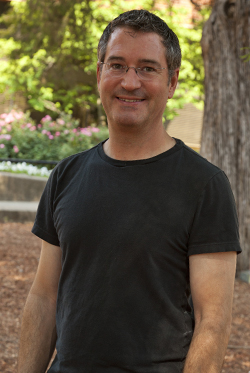 Dr. Daniel WhelanToward the end of his undergraduate years at the University of Wisconsin at Madison, Daniel Whelan got “an inkling” he might want to be a college teacher.
Dr. Daniel WhelanToward the end of his undergraduate years at the University of Wisconsin at Madison, Daniel Whelan got “an inkling” he might want to be a college teacher.
Still the Minneapolis, Minn. native left school with a degree in politics and international relations asking “What am I going to do?”
After looking at his transcript and noting a “significant lack of quantitative skills,” his adviser offered little in the way of encouragement.
Following graduation, he worked briefly as a telephone operator at an answering service before returning to Madrid, Spain, where he had studied during his junior year, to teach English.
In the spring, he applied to graduate school at American University in Washington, D.C. While he was accepted, he wasn’t sure how he was going to pay for it. When he called the graduate school’s financial aid office to inquire about working on campus, they asked,”Do you know how to answer phones?” He got an interview shortly before classes were to start and boldly asked, “Should I get a one-way or round trip ticket?” The former, he was told.
So in fall 1989, Whelan arrived in Washington D.C. with $600 to his name and an aptitude for answering the phone. And he could type.
Enrolled in American’s School of international Service, he concentrated in peace and conflict resolution as the world was watching the fall of the Berlin Wall.
“It was a fascinating time to be in school,” said Whelan, who completed his master’s degree in three years.
For his thesis, he examined contemporary HIV AIDS policies – which at the time included traditional public health approaches, such as quarantine, mandatory testing, and travel and immigration restrictions – through the lens of human rights.
His interest in human rights led to a position as a research analyst for the International Center for Research on Women’s Women in AIDS program. He learned the administrative side of grants management and helped write policy papers and project briefs.
“That was really great because it helped me to be a writer,” said Whelan.
But after five years, Whelan was at a crossroads and needed to go back to school. He considered a public health degree and law school, before admitting, “I think it’s time.” He applied to the Ph.D. program at University of Denver’s Josef Korbel School of International Studies, which was named after former U.S. Secretary of State Madeline Albright’s father and former Secretary of State Condoleeza Rice’s mentor.
After working in the policy world, Whelan felt lost during his first year of graduate school.
“People weren’t studying same thing anymore,” he said. “Everything was about post modernism, post structuralism, post this, post that.”
While Whelan was working in D.C., post-Cold War political scholarship was blossoming.
He studied for two years and thought about his dissertation for three years. Meanwhile, he cobbled together a living teaching part-time at the University of Denver and Metro State College of Denver.
“That’s how I got my feet wet teaching,” he said. “And I enjoyed it.”
But working 60 or so hours a week, he thought, “When am I going to write my dissertation?”
Then the graduate dean said “What can I do to help you get out of here?”
Serendipitously, the University of Denver was about to assume the leadership of the Association of Professional Schools of International Affairs (APSIA). Whelan became the elite consortium’s executive director, with a full-time salary, health benefits, and enough time to focus on completing his dissertation.
“It was perfect … I was rescued,” said Whelan, who wrote his dissertation in 15 months and set about searching for a teaching position.
In fall 2005, he met Ian King, Jay Barth, and Kim Maslin-Wicks at an American Political Science Association meeting. Later in the spring, he formally applied for a position in the department. He was offered a job, beginning fall 2006, teaching international relations and political theory courses, including Western Political Thought and State and Civil Society.
When Whelan first arrived, he was active in helping the politics department revise the International Relations-Global Studies major, a “homeless major” that was not based in one academic department. The result was the new International Relations major housed in the Politics Department.
The solution was “hugely successful,” Whelan thinks. And it was made possible by the collegial faculty culture that exists at Hendrix, he added.
“I love working here,” he said. “This is so out of the ball park different than what I have experienced.”
“For a long time, I kept thinking ‘When will it be revealed to me ... the true nature?’” Whelan joked. “But it’s never happened. Faculty members may have ‘healthy differences,’ but they respect one another.”
“It’s why I love working here,” he said. “Something about this place attracts people who are truly collegial.”
“It’s a real pleasure,” he said. “It allows us to focus our attention on what we’re supposed to do, which is teaching, and not get caught up in intrigues.”
The emphasis on engaged learning at Hendrix also appeals to Whelan, a self-described “practical idealist.”
“I believe in the notion of engaged learning, and I believe in what goes on in the classroom … deep reading and struggling with ideas,” he said. “Engagement without the other is an empty proposition.”
As the College and its culture continue to evolve, Whelan would also love to see faculty have more opportunities to enjoy informal time with students, perhaps to discuss a book that is not a part of class or other forms of engaged learning that promote more student-faculty fellowship
“We should think about how to creatively restructure the academic space to allow open-ended, informal but really important engagement,” he said. “These encounters outside of the classroom are more worthwhile, more fun, and more engaging. They set us apart and are really commensurate with our culture.”